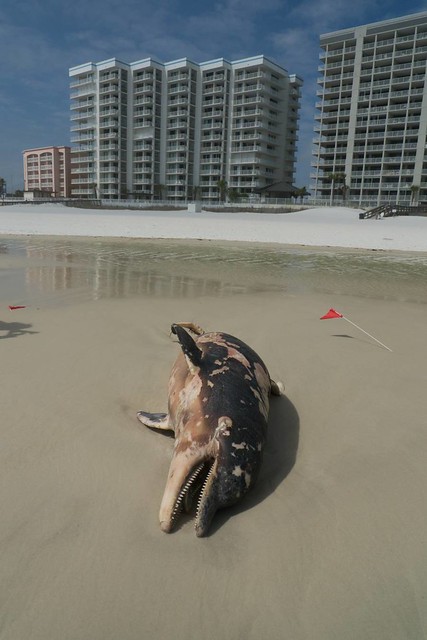Death of a Dolphin Sparks Anger in the Gulf
Capt Lori DeAngelis runs a boating business called Dolphin Queen Cruises, which ferries tourists in Orange Beach, AL, to see pods of dolphins at play in the Gulf. Capt Lori reveres dolphins. In fact, she used to be licensed to handle the federally protected mammals.
“They are like kin to us,” she says.
The BP oil disaster put a huge dent in Capt Lori’s dolphin-watching business, but now it’s personal. Recently she watched over a young adult male dolphin that had washed up on the sandy shores of Orange Beach, lying motionless with its mouth agape.
“We tried to keep the kids away from it, but tourists kept coming up to look at the badly decomposed carcass. It was lying there from 6 am until past two in the afternoon. It was something I wouldn’t want any child to see.”

Young adult dolphin in Orange Beach, AL Photo by Jerry Cope
Now at least 87 bottle-nosed dolphins, mostly very young or calves, have been found near the shores of Alabama, Mississippi and Louisiana over the past two months, about 15 times the normal amount. The number of dead mammals found this year almost equals the total number collected in 2010. Five more were added to the list the day this one was found. The federal government has declared this unprecedented die-off an “unusual mortality event,” the equivalent of a governor declaring a state of emergency following a natural disaster. This means federal money will be thrown at the difficult job of figuring out exactly what is causing this tragedy.
Many on the Gulf like Capt. Lori think they know already. “The oil is toxic, and it’s even more so with all the dispersant they sprayed out there. Anytime you have that much oil in the water you should expect to be collecting dead fish and animals. Nothing will stop this from rearing its ugly head for years to come.”
Scientists say they are still searching for answers. As my colleague Michael Jasny has blogged, the cause of this may never be proven. But the toll keeps mounting. Experts say many more animals have died than have been found or washed ashore. And Capt. Lori believes many more have just been buried by cleanup workers or never counted at all.
“I’m flabbergasted that we allow BP to be responsible to clean up their own mess when they will be fined for every animal or bird they find. We need to demand they be counted properly and BP be held account able.”
Watch this video by Jerry Cope of Capt Lori talking about the dolphin they found on Orange Beach.
No one knows how many young dolphins have perished in the waves. As the weather continues to warm and more vacationers and fishermen venture into the Gulf and marshes, Capt Lori says it’s likely many more of these iconic animals will be found dead.
As dolphins die in increasing numbers, we are left with questions about what to do. Perhaps we will never be certain what caused this. But we do know there is a better way forward to protect the Gulf and make it whole again. It’s not drilling faster and further out into the deep blue sea. This will never quench our insatiable thirst for oil. And as my NRDC colleague Regan Nelson blogged recently, it’s not clear the safeguards are there to prevent another oil disaster of this magnitude.
So let’s think about the real costs. Presidents from both side of the aisle have urged us to end our addiction to oil. We desperately need to move away from dirty fossil fuels and towards a clean energy economy. It’s not just to protect our national security or our health. It’s also about preserving walks on the beach with our children.
